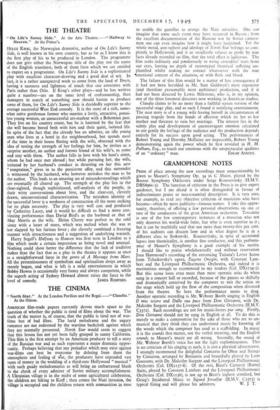GRAMOPHONE NOTES
PRIDE of place among the new recordings must unquestionably be given to Mozart's Symphony Op. 34 in C Major, played by the Boston Symphony Odchestra under Serge Koussevitzky (H.M.V. DBS8961-3). The function of criticism in the Press is to give expert guidance, but I am afraid it is often disregarded in favour of indiscriminate praise or non-coinmital description. It is very rare, for example, to read any objective criticism of musicians who have become—often by mere publicity—famous names. I take this oppor- tunity, therefore, of offering a few personal observations on one or two of the conductors of the great American orchestras. Toscanini is one of the few contemporary instances of a musician who not only deserves his world-wide fame, but who is even superior to it ; but it can be truthfully said that not more than twenty-five per cent. of his auditors can discern how and in what degree he is in a different class to Stokowski. Koussevitzky, in spite of occasional lapses into theatricality, is another fine conductor, and this perform- ance of Mozart's Symphony is a good example of his merits. I should like to praise wholeheartedly and without reservation Joan Hammond's recording of the entrancing Tatiana's Letter Scene from Tchaikovsky's opera, Eugene Onegin, with Constant Lam- bert and the Liverpool Philharmonic Orchestra, and indeed it is meritorious enough to recommend to my readers (Col. DX1134-5). But this scene loses even more than most operatic arias do when sung in a concert hall or recorded, because of the pauses so skilfully and dramatically contrived by the composer to suit the action on the stage which hold up the flow of the composition when divorced from the theatre. So here the performance seems to drag. Another operatic recording is Mr. Webster Booth singing in English 11 mio tesoro and Dalla sue pace from Don Giovanni, with Dr. Malcolm Sargent and the Liverpool Philharmonic Orchestra (H.M.V. C3372). Such recordings are not for music-lovers pur sang. Firstly, Don Giovanni should not be sung in English at all. To do this is merely to make a compromise for the sake of those who are so un- musical that they think they can understand music by knowing all the words which the composer has used as a scaffolding. In music it is the sounds that matter, not the verbal meaning, and the English sounds to Mozart's music are all wrong. Secondly, the sound of Mr. Webster Booth's voice has not the right euphoniousness. This is no criticism of his singing as such, it is just a physical idiosyncrasy. I strongly recommend the delightful Concerto for Oboe and Strings by Cimarosa, arranged by Benjamin and beautifully played by Leon Goossens, with Dr. Malcolm Sargent and the Liverpool Philharmonic Orchestra (Col. DX1137-8). Of the rest, Bizet's Carnaval (Roma) Suite, played by Constant Lambert and the Liverpool Philharmonic Orchestra (Col. DX 1136), is not up to Bizet's highest standard, but .Grieg's Incidental Music to Sigurd jorsalfar (H.M.V. C3373) is typical Grieg and will please his admirers. W. J. T.


























 Previous page
Previous page